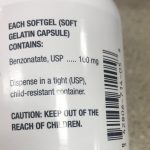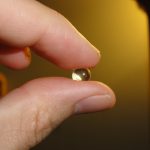Does Benzonatate Make You Hallucinate?

The word “hallucination” comes from Latin and means “to wander mentally.” Hallucinations are defined as the “perception of a nonexistent object or event” and “sensory experiences that are not caused by stimulation of the relevant sensory organs.”
In layman’s terms, hallucinations involve hearing, seeing, feeling, smelling, or even tasting things that are not real. Auditory hallucinations, which involve hearing voices or other sounds that have no physical source, are the most common type.
Hallucinations occur frequently in people with psychiatric conditions, including schizophrenia and bipolar disorder, however, you don’t necessarily need to have a mental illness to experience hallucinations. Many medications and illegal drugs such as amphetamines, cocaine, LSD or ecstasy can also cause hallucinations. They can also occur during withdrawal from alcohol or drugs if you suddenly stop taking them. Drug-induced hallucinations are usually visual, but they may affect other senses.
What is benzonatate?
Benzonatate is used to relieve cough. Benzonatate is in a class of medications called antitussives (cough suppressants). It works by reducing the cough reflex in the lungs and air passages.
Benzonatate does not help with mucus but only helps to stop you from coughing. Since the medication stops the urge to cough, less mucus can be cleared from your lungs and airways. This might cause mucus to build up in these areas, so it’s not the best option if you are looking to clear any mucus or phlegm from your airways by coughing.
How should I take benzonatate?
Benzonatate comes as a liquid-filled capsule and a capsule to take by mouth. It is usually taken three times a day as needed. Follow the directions on your prescription label carefully, and ask your doctor or pharmacist to explain any part you do not understand. Take benzonatate exactly as directed. Do not take more or less of it or take it more often than prescribed by your doctor.
Adults and children over 10 years old: Take 100 mg to 200 mg by mouth three times a day as needed for cough. Do not take more than 600 mg per day.
Benzonatate is not safe to use for children under 10 years old. Ask your child’s provider for cough medications that are appropriate for your child.
Swallow the capsules and liquid-filled capsules whole; do not break, dissolve, cut, crush, suck or chew them. If the medication is released into the mouth, it may make the mouth numb and cause choking. Do not eat or drink if you feel numbness or tingling in your mouth, tongue, throat, or face. If feelings of numbness or tingling continue or get worse, get medical help right away.
How does benzonatate make you feel?
Benzonatate works within 15 to 20 minutes and can last up to 8 hours but can trigger central nervous system (CNS) problems, such as visual hallucinations, headache, confusion, and dizziness within an hour of taking a dose of the drug. These rapid or early side effects generally fade as the drug wears off in three to eight hours.
Using benzonatate with alcohol or marijuana (cannabis) can also make you more dizzy or drowsy. Do not drive, use machinery, or do anything that needs alertness until you can do it safely.
How long do benzonatate-induced hallucinations last?
Benzonatate-induced hallucinations are typically very temporary, resolving in a couple of hours (three to eight hours) or days at most. However, sometimes drug-induced hallucinations can be a very serious symptom that requires emergency medical intervention. One in five people with a history of psychosis will attempt to kill themselves during this period.
What are the other side effects of benzonatate?
Side effects of benzonatate that you should report to your doctor or health care professional as soon as possible:
• allergic reactions like skin rash, itching or hives, swelling of the face, lips, or tongue
• breathing problems
• chest pain
• confusion or hallucinations
• irregular heartbeat
• numbness of mouth or throat
• seizures
Side effects of benzonatate that usually do not require medical attention (report to your doctor or health care professional if they continue or are bothersome):
• burning feeling in the eyes
• constipation
• headache
• nasal congestion
• stomach upset
This list may not describe all possible side effects of benzonatate. Call your doctor for medical advice about side effects. You may report side effects to FDA at 1-800-FDA-1088.
What other drugs will affect benzonatate?
Using benzonatate with other drugs that make you drowsy can worsen this effect. Ask your doctor before using opioid medication, a sleeping pill, a muscle relaxer, or medicine for anxiety or seizures.
Other drugs may interact with benzonatate, including prescription and over-the-counter medicines, vitamins, and herbal products. Tell your doctor about all your current medicines and any medicine you start or stop using.




